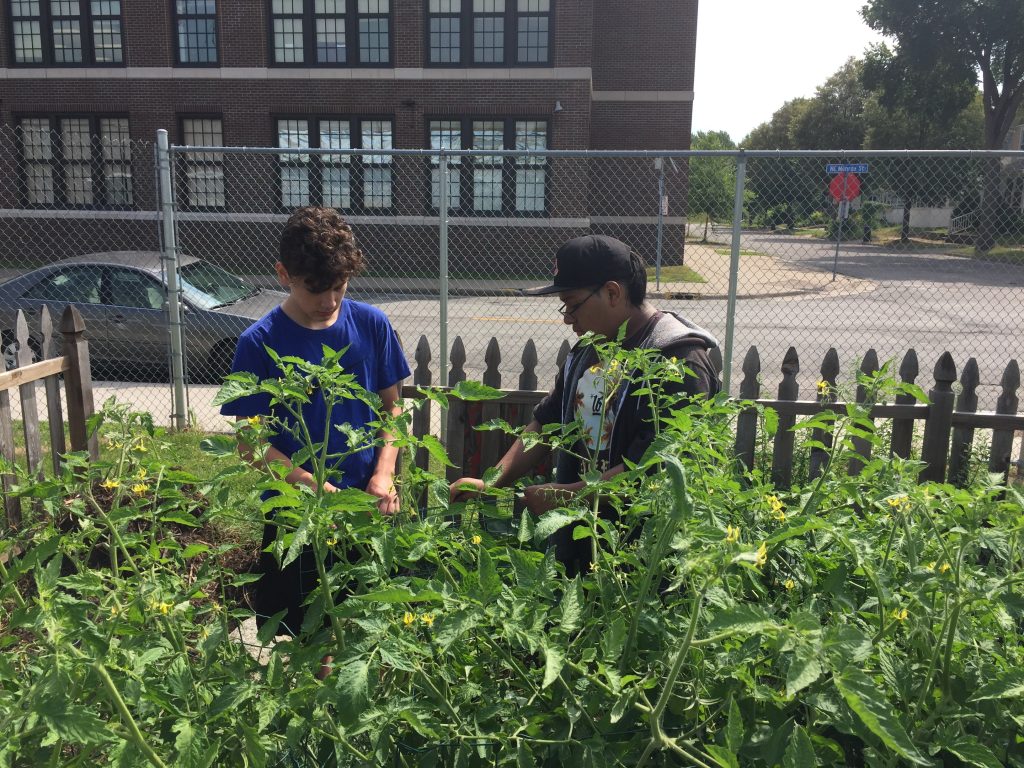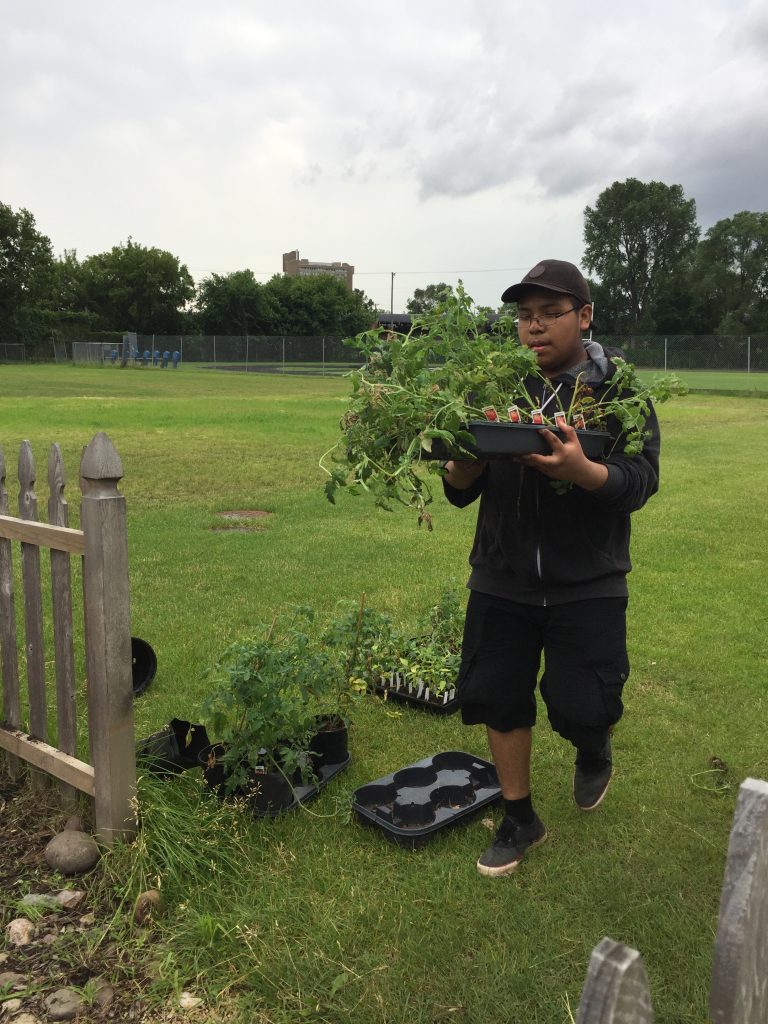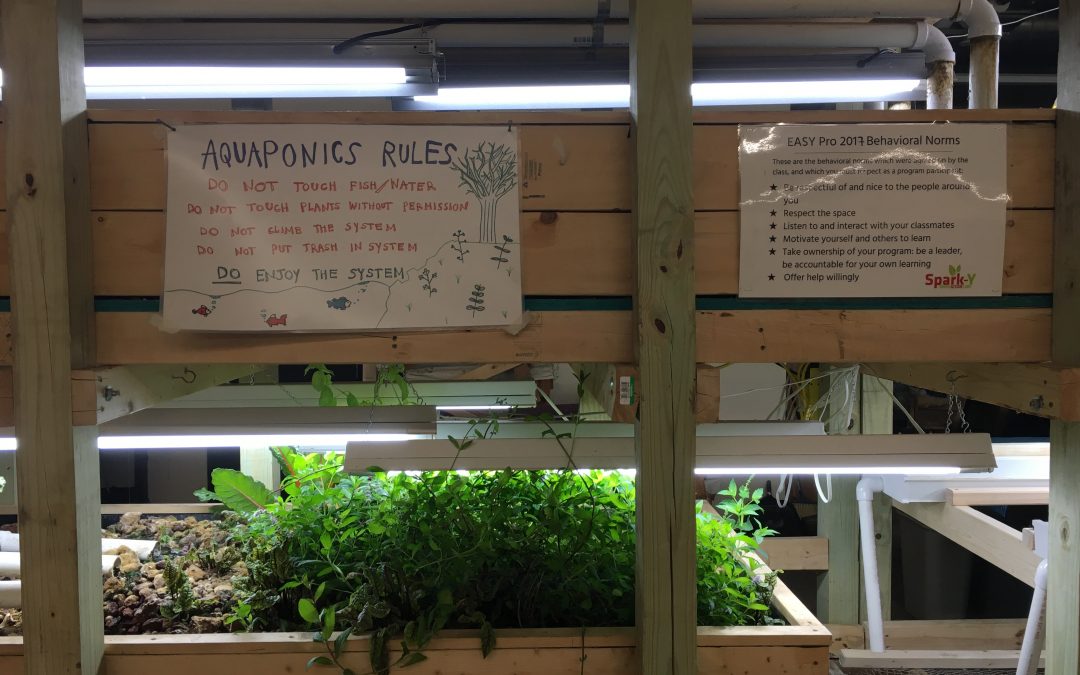By. Carley Rice, Spark-Y
In many ways, empowering youth is a lot like tending a garden. Where a garden needs water, sunlight, and pollinators, a student needs attention, trust, responsibility, and encouragement. At Spark-Y our mission, at its core, is to empower youth. Spark-Y is a nonprofit operating in the Twin Cities of Minnesota. We partner with 15 area schools to provide hands-on, STEM-related (science, technology, engineering, and math) programming. We also host an internship program for 30+ youth each summer and run a functioning indoor urban farm. On a daily basis we see the benefits of providing underserved youth with opportunity, trust, and a good challenge.
At Spark-Y we believe there is great value in empowering young people to grow their own food. Many urban youth have never planted a seed, watered a garden, or eaten food that they’ve had a hand in growing. Many of these youth live in neighborhoods that are considered food deserts. This puts them at a double disadvantage: they don’t have the skills to grow their own fresh food and they don’t have easy access to fresh food in their neighborhood markets. This is a tragedy for our young people. At Spark-Y we work to remedy this issue by teaching students how to grow food, prepare food, and understand the science behind sustainable agriculture.
Our model is simple: we pair hands-on agriculture systems, such as aquaponics systems, with curriculum focused on sustainability, entrepreneurship, and STEM-based learning. A great example of Spark-Y’s work with schools can be seen at Edison High School in Minneapolis, Minnesota. Students at Edison participate in our Edible Agriculture School Yard Professionals course, where they plant, maintain, harvest, and sell fresh produce that’s grown using a variety of sustainable growing systems. This course, also known as EasyPro, is changing the way that students in Northeast Minneapolis view themselves, their abilities, and their community.

The 2019 – 2020 school year marks the fourth year of EasyPro at Edison. Students in the EasyPro class serve as the primary care team for the majority of the school’s green campus systems. These systems include a state-of-the-art aquaponics system, a community garden, a greenhouse, and a vermicompost bin. Having a variety of growing systems at their disposal allows students to grow food all year long. In the summer, these growing systems are tended to by a cohort of interns. During the school year, Edison students take over. In addition to these systems, Edison also uses solar energy and captures and recycles 1.5 million gallons of water each year through innovative stormwater catchment systems. These green initiatives provide Edison students with incredible learning tools to take a deep dive into sustainable systems.
The bulk of the EasyPro course’s curriculum is hands-on, place-based, and project-based. We see great value in allowing students to get their hands dirty, problem-solve, and find innovative solutions without close guidance from their teachers. Students have a high level of autonomy in this course and have near full control of garden design and planning. Last year, students decided to plant a variety of squash. They found a squash variety seed pack and planted the seeds in a large plot. Months later, when it came time to harvest, students discovered that the seeds they had planted were in fact all pumpkins! They took this unexpected result in stride and sold 12 pumpkins to the Edison cafeteria. The cafeteria chef, being a great supporter of the school’s Garden to Cafeteria program, got creative and made pumpkin fries for lunch. It’s learning experiences like this one that provide memorable experiences and lessons for students.
Courses like EasyPro not only provide learning experiences for students but serve as real-world business ventures. Edison’s Garden to Cafeteria program allows students to grow food and then sell it to the cafeteria and make a profit for their class. Students are involved in nearly every step of the food system from planting the seed, to delivering the fully grown product to the chef. Last year, students sold a total of 70 pounds of produce from the community garden and greenhouse to the cafeteria. Much of the produce found its way to Edison’s fresh salad bar. Students sold tomatoes, cucumber, greens, and watermelon that they were able to eat as part of a nutritious lunch!

In addition to outdoor growing systems, students also tend to and maintain an indoor aquaponics system. Aquaponics is a sustainable way of growing plants and raising fish simultaneously. With a little help from the nitrogen cycle, the plants and the fish receive nutrients that they need to thrive. Last year at Edison, the aquaponics system provided enough food for a family-style meal at the end of the semester. Students took part in capturing, filleting, and cooking bluegill for fish tacos. They also harvested greens and herbs from the system to garnish their meal. It’s amazing to see how excited students are to be involved with growing and preparing their own meal. Students leave the EasyPro course more knowledgeable about growing food AND empowered with the realization that they are capable of more than they thought.
Spark-Y educator, Sarah Pilato, has been the brain behind the EasyPro course for the past three years. Her work at Edison is transforming the way students think about food systems in their community while empowering them to believe in their own skills and abilities. Sarah states, “My favorite part of this program, because I am in the classroom every day, is that I can build really strong relationships with my students. I am able to see major growth in my students throughout the year. I get to see students who start out very apathetic and unmotivated and by the end of the year, they are testing water quality without prompting. Every time I get to witness students who end up being just a little more excited about going to school.”
One student, in particular, is a wonderful example of an EasyPro success story. Jahir was a student in EasyPro during the 2017 – 2018 school year. His participation in the course ignited a passion for aquaponics and gardening. Since then, Jahir has interned with Spark-Y for two summers in a row and continues to further his knowledge in all things sustainability and agriculture. Last school year, Jahir approached the EasyPro teaching team and expressed an interest in serving as a teaching assistant for the course. His passion for aquaponics and growing food is such an inspiration for our educators. Students like Jahir show us that we are truly changing lives. Working with Minneapolis youth gives us hope for our future. It can be a sustainable future; we just need to plant the seeds and watch them grow.
Author Bio
Carley Rice joined Spark-Y in June 2018 as a Lead Sustainability Educator, overseeing multiple school programs and internships. Carley has a B.S. from Western Michigan University and an M.S. from James Madison University and the University of Malta where she studied Sustainability. Her graduate research looked at the impacts of educational programming at zoos and aquaria. Carley is originally from Michigan and worked in environmental education for the State of Michigan and for the University of Southern Mississippi before relocating to Minnesota to work with Spark-Y.

